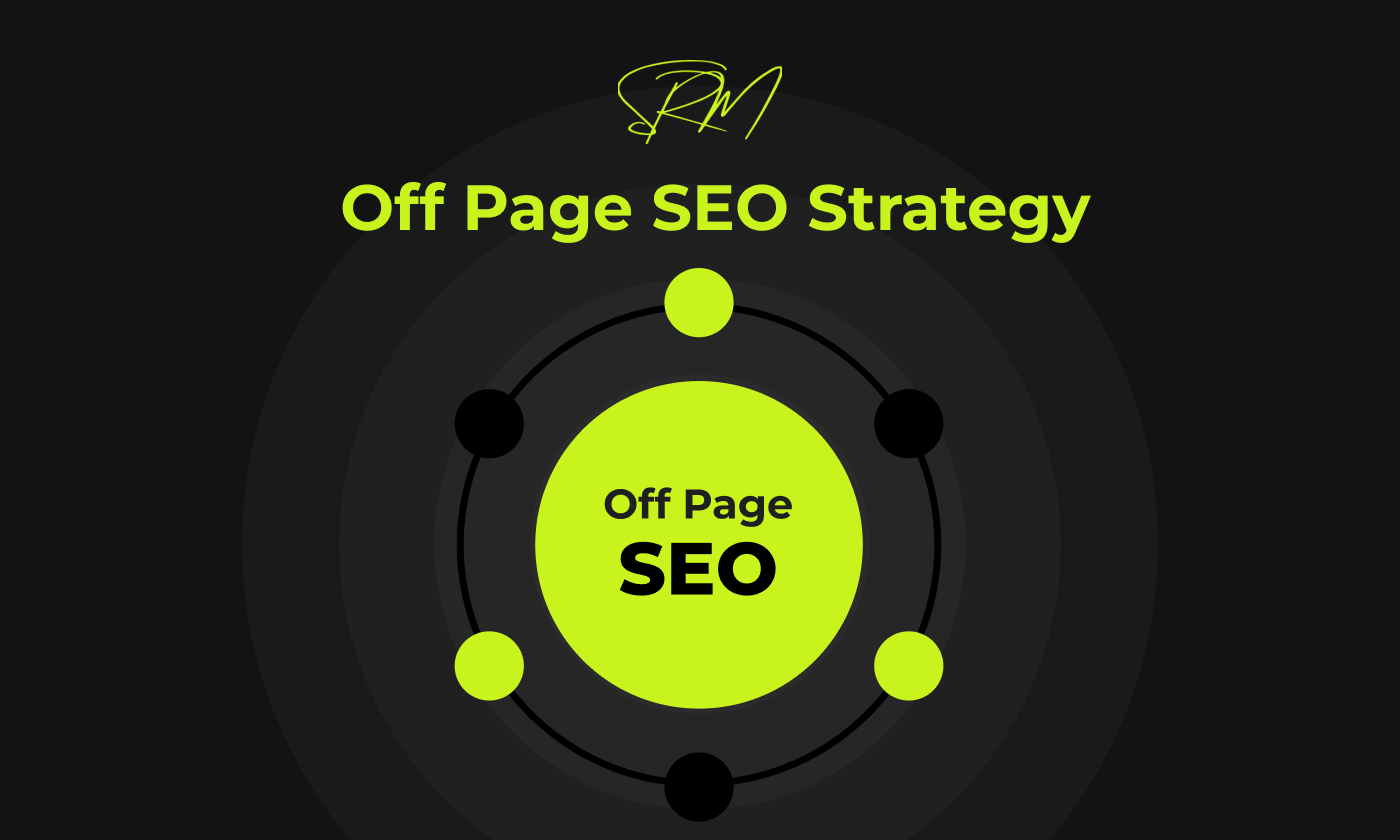
SEO, or Search Engine Optimization, is about making your website more visible to people searching for things online. Most businesses focus on optimizing their website’s content and structure, which is known as on-page SEO. However, what many don’t realize is that activities outside the website also play a huge role in boosting search engine rankings. This is where an off-page SEO strategy comes in. It includes everything you do outside your website, like building backlinks, engaging on social media, and managing your brand reputation, to improve your site’s authority and visibility.
In this blog, we’ll dive into what off-page SEO is, why it’s so important, and how to create a solid strategy that will help you grow your online presence for the long term.
Understanding Off Page SEO
Off-page SEO refers to the actions you take outside of your own website to boost its ranking in search results. If other trusted websites, social media platforms, and users are talking about and linking to your site, search engines like Google will see it as valuable and trustworthy.
It’s not just about promoting your site; it’s about showing search engines that your website is a respected part of the larger online community. By using an effective off-page SEO strategy, you help search engines understand that your content is reliable and relevant.
Importance of SEO Beyond Your Website
Search engines don’t only look at what’s on your website. They also consider how other websites interact with yours. For example, if your website has a lot of backlinks from high-quality sources, it signals to search engines that your content is trustworthy and worth ranking higher. Similarly, mentions of your brand on social media or positive online reviews add to this trust.
The Role of Off Page SEO in Long-Term Success
Unlike some quick fixes in digital marketing, such as paid ads, off-page SEO takes time to build but provides lasting results. A strong off-page SEO strategy is considered as a strong SEO marketing strategy that establishes your website’s authority and helps maintain its rankings over time. Once your site is seen as a trusted resource, it continues to attract organic traffic even if you’re not actively promoting it.
Building Domain Authority
Domain authority is a measure of how trustworthy and relevant your website is compared to others. Search engines use this as a ranking factor, and it’s heavily influenced by off-page SEO factors. The stronger your domain authority, the more likely you are to rank higher for competitive keywords.
How Off Page SEO Helps Build Authority
When reputable websites link to your site, it’s like a vote of confidence. Search engines consider these links as proof that your website is reliable and important. Similarly, consistent mentions of your brand across the internet increase your visibility and build trust.
Enhancing Brand Visibility and Credibility
A strong off-page SEO plan not only improves your rankings but also builds your brand’s credibility. When people see your website mentioned on authoritative sites, in online reviews, or through social media, it creates a positive impression. Over time, this visibility helps establish your business as a leader in your industry.
Key Elements of a Strong Off Page SEO Strategy
An effective off-page SEO plan is made up of several key components. By focusing on these elements, you can build a strategy that improves your website’s performance in the long run.
1. Quality Backlinks
Backlinks are the backbone of off-page SEO. These are links from other websites that point to yours. But not all backlinks are created equal. High-quality backlinks from reputable websites carry more weight than a large number of links from low-quality sites.
Here are some ways to build quality backlinks:
- Guest Posting: Write useful articles for well-known websites in your niche and include a link back to your site.
- Competitor Analysis: Check where your competitors are getting their backlinks and explore if you can earn similar ones.
2. Social Media Engagement
Social media platforms are excellent for spreading your content and engaging with your audience. While social media links don’t directly improve your search engine rankings, they help by driving traffic to your site and increasing its visibility.
Here’s how to use social media effectively:
- Post regularly and share updates, blog posts, and helpful tips.
- Run ads to boost the visibility of important posts or announcements.
3. Online Reviews and Reputation Management
Online reviews play a key role in shaping your brand’s reputation. Positive reviews not only attract new customers but also improve your local SEO rankings. Search engines like Google consider customer feedback when ranking local businesses.
Here are some tips for managing online reviews:
- Ask happy customers to leave reviews on platforms like Google My Business or Yelp.
- Respond to all reviews, even negative ones, to show you care about your customers.
- Regularly monitor your brand’s reputation using tools that track mentions and reviews.
Benefits of Focusing on Off Page SEO
A solid off-page SEO strategy can transform your website’s performance. It helps you rank higher in search results by improving your authority and trustworthiness. Over time, this leads to a consistent flow of organic traffic and builds a credible online presence. High-quality backlinks, social media activity, and positive reviews work together to strengthen your brand and help you stand out in competitive markets.
Common Mistakes to Avoid in Off Page SEO
While off-page SEO can bring amazing results, certain mistakes can harm your website’s reputation and rankings. Here are some pitfalls to avoid:
1. Overlooking the Quality of Backlinks
Getting lots of backlinks from low-quality or spammy websites may seem like a quick win, but it can backfire. Search engines penalize sites that rely on such links, so focus on earning backlinks from trusted and relevant sources.
2. Ignoring Local SEO and Citations
If your business serves local customers, ignoring local SEO is a missed opportunity. Make sure your business is listed in local directories and your NAP (Name, Address, and Phone Number) is consistent across all platforms. Local citations help build trust and improve your rankings in local search results.
Conclusion
Off-page SEO is all about building your website’s authority and reputation through activities that happen outside your site. By focusing on high-quality backlinks, engaging with your audience on social media, and maintaining a positive online reputation, you can create a strong foundation for your website’s success. An effective off-page SEO strategy given by an SEO expert takes time, but it pays off with long-term benefits. Not only will your website rank higher in search results, but it will also attract consistent organic traffic and build trust with your audience. By putting in the effort now and staying consistent, you can ensure your website thrives in the competitive online world.
FAQ
What is off-page SEO and how does it differ from on-page SEO?
Off-page SEO refers to actions taken outside of your website to improve its ranking in search results, such as building backlinks and managing your online reputation. Unlike on-page SEO, which focuses on content and site structure, off-page SEO helps establish your website’s authority and visibility in the broader online community.
Why are backlinks so important for off-page SEO?
Backlinks are crucial because they act as “votes of confidence” from other reputable websites. Search engines use backlinks to evaluate the trustworthiness and relevance of your site. High-quality backlinks from authoritative sites can significantly boost your rankings and improve your site’s credibility.
How does social media engagement impact off-page SEO?
While social media links don’t directly affect search engine rankings, they help increase your website’s visibility and drive traffic. Engaging with your audience on social media platforms can amplify your content and enhance your brand’s overall presence, indirectly benefiting your SEO efforts.
How do online reviews influence my SEO strategy?
Online reviews, especially positive ones, can greatly influence your local SEO rankings. Search engines like Google consider customer feedback when ranking local businesses. Encouraging satisfied customers to leave reviews and responding to both positive and negative feedback helps build trust and improve your rankings.
What are common mistakes to avoid in off-page SEO?
Some common mistakes include focusing on low-quality backlinks, which can harm your site’s reputation, and ignoring local SEO efforts. It’s important to prioritize high-quality backlinks, manage your online reputation carefully, and ensure consistent business listings and citations to avoid penalties and missed opportunities.





